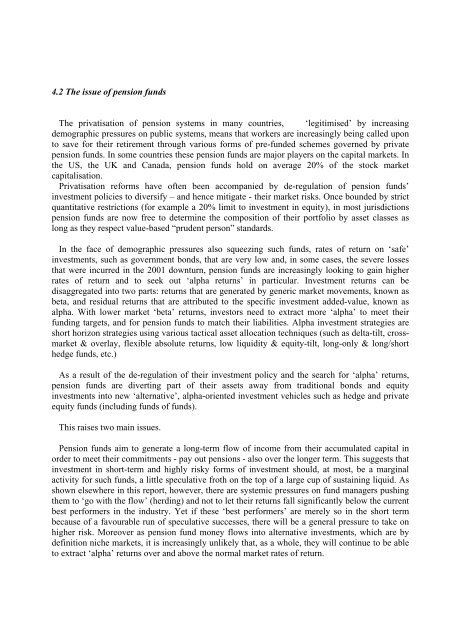Executive summary - Udo Bullmann
Executive summary - Udo Bullmann
Executive summary - Udo Bullmann
- No tags were found...
You also want an ePaper? Increase the reach of your titles
YUMPU automatically turns print PDFs into web optimized ePapers that Google loves.
4.2 The issue of pension fundsThe privatisation of pension systems in many countries, ‘legitimised’ by increasingdemographic pressures on public systems, means that workers are increasingly being called uponto save for their retirement through various forms of pre-funded schemes governed by privatepension funds. In some countries these pension funds are major players on the capital markets. Inthe US, the UK and Canada, pension funds hold on average 20% of the stock marketcapitalisation.Privatisation reforms have often been accompanied by de-regulation of pension funds’investment policies to diversify – and hence mitigate - their market risks. Once bounded by strictquantitative restrictions (for example a 20% limit to investment in equity), in most jurisdictionspension funds are now free to determine the composition of their portfolio by asset classes aslong as they respect value-based “prudent person” standards.In the face of demographic pressures also squeezing such funds, rates of return on ‘safe’investments, such as government bonds, that are very low and, in some cases, the severe lossesthat were incurred in the 2001 downturn, pension funds are increasingly looking to gain higherrates of return and to seek out ‘alpha returns’ in particular. Investment returns can bedisaggregated into two parts: returns that are generated by generic market movements, known asbeta, and residual returns that are attributed to the specific investment added-value, known asalpha. With lower market ‘beta’ returns, investors need to extract more ‘alpha’ to meet theirfunding targets, and for pension funds to match their liabilities. Alpha investment strategies areshort horizon strategies using various tactical asset allocation techniques (such as delta-tilt, crossmarket& overlay, flexible absolute returns, low liquidity & equity-tilt, long-only & long/shorthedge funds, etc.)As a result of the de-regulation of their investment policy and the search for ‘alpha’ returns,pension funds are diverting part of their assets away from traditional bonds and equityinvestments into new ‘alternative’, alpha-oriented investment vehicles such as hedge and privateequity funds (including funds of funds).This raises two main issues.Pension funds aim to generate a long-term flow of income from their accumulated capital inorder to meet their commitments - pay out pensions - also over the longer term. This suggests thatinvestment in short-term and highly risky forms of investment should, at most, be a marginalactivity for such funds, a little speculative froth on the top of a large cup of sustaining liquid. Asshown elsewhere in this report, however, there are systemic pressures on fund managers pushingthem to ‘go with the flow’ (herding) and not to let their returns fall significantly below the currentbest performers in the industry. Yet if these ‘best performers’ are merely so in the short termbecause of a favourable run of speculative successes, there will be a general pressure to take onhigher risk. Moreover as pension fund money flows into alternative investments, which are bydefinition niche markets, it is increasingly unlikely that, as a whole, they will continue to be ableto extract ‘alpha’ returns over and above the normal market rates of return.





